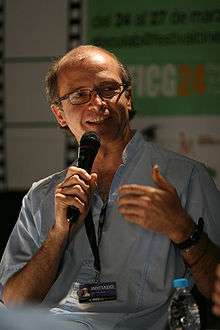Juan Carlos Rulfo
Juan Carlos Rulfo Aparicio (born January 24, 1964 in Mexico City) is a Mexican screenwriter and director and the son of author Juan Rulfo. He has written, produced, and photographed several films. He is married to Valentina Leduc Navarro, a Mexican director.
Juan Carlos Rulfo | |
|---|---|
 | |
| Born | Juan Carlos Rulfo Aparicio 1964 |
| Years active | 1994 – present |
| Spouse(s) | Valentina Leduc Navarro |
Juan Nepomuceno Carlos Pérez Rulfo Aparicio, the son of the Mexican writer Juan Rulfo and Clara Aparicio de Rulfo, studied film at the Autonomous Metropolitan University in Xochimilco and at the Cinematographic Training Center in Mexico City. Due to the heritage his father left him, Juan Carlos has naturally known how to translate cinematographic narrative from rural Mexico to his father's workings of literature while making a name for himself and his talent in the shadow of his father.
His first film was his thesis for his graduation from film school and was called Grandfather Cheno and Other Stories. This documentary tells the story of his grandfather and fits it in with his father's story Tell Them Not to Kill Me.
Rulfo's movie In The Pit won the Grand Jury Prize for an International Documentary at the Sundance Film Festival. He also won the Ariel Awards for Best Editing and Best First Work for his movie Del Olvido al No me Acuerdo, and was nominated for Best Direction and Best Screenplay Written Directly for the Screen. Rulfo has also won at the Goya Awards, the Guadalajara International Film Festival, the Havana Film Festival, the Karlovy Vary International Film Festival, the Montréal World Film Festival.[1]
Films
As director
- El Abuelo Cheno y Otras Historias (1994)
- Del Olvido al no me Acuerdo (1999)
- Diminutos del Calvario (2000)
- El Crucero (2006)
- In The Pit (2006)
- Los que se quedan (2008)
- Será por eso (2010)
- Madero muerto, memoria viva (2010)
- Carrière, 250 meters (2012)
- De panzazo (2012)